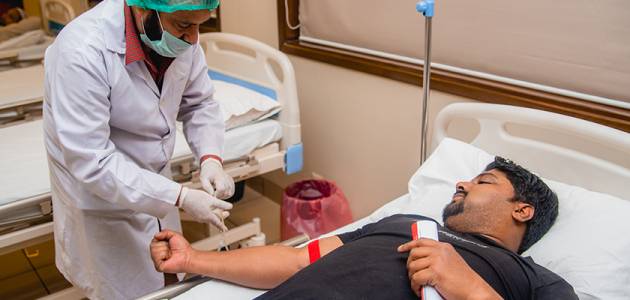
During his blood transfusion at Husaini Blood Bank, 26-year-old thalassemia patient Ali Mohammed relates his experience. He is a businessman from Badin, and owns a mobile shop in addition to operating a transport company. He travelled far from Badin to Karachi in order to receive his blood transfusion treatment. Since he has been coming to the Blood Bank for the past 25 years, he said that the faculty has become his family.
Patients with thalassemia receive free blood transfusions and treatment at Husaini Blood Bank. 17-year-old Ahmed Raza also travelled to Husaini Blood Bank for a blood transfusion. He is a student in the Husaini Institute of Haematology's phlebotomy training course. He now plans to work as faculty at Husaini Blood bank. "This facility is exceptional because it empowers thalassemia patients in addition to providing for their needs", he says.
Patients with thalassemia enroll themselves in a variety of training courses offered by the Husaini Institute of Haematology, which gives them confidence and presents them with several opportunities. This Institute converts a patient into healthcare faculty, and this transition is remarkable. They also have differently-abled persons, and people with special needs, working in their pathology laboratory. If customers choose to have their samples collected at home, they receive a 40% discount on their bill.
One of the flood victims was Arshad (technician), a Naushahro Feroze resident. The flood caused him to lose his job. He was assisted and trained by Husaini's blood bank. He is now living a life filled with possibilities. For Arshad, this difficulty was a blessing. Another crucial component of this organisation is blood donation.
The donor travelled here to donate blood for a worthwhile cause. Their blood is examined and results are provided by Husaini Blood Bank. If the donor tests positive for hepatitis B or C, the Husaini Blood Bank will provide free treatment. Their goal is to provide their patients with the safest blood possible. They take care of their donors and patients in order to realise this aim.
Everyone has the right to live a full and complete life. Our society believes that a thalassemia patient should expect to live for 12 to 20 years, but Husaini Blood Bank has dispelled this misconception. Thalassemia patients over the age of 45 are also treated at the facility.
This institution's dedication demonstrates how providing appropriate medical faculties and opportunity might raise the life expectancy rate. In addition, our government needs to educate Pakistanis about major and minor thalassemia disorders. Education and awareness will also help in slowing down Pakistan's rapidly rising thalassemia rate.
Patients with thalassemia receive free blood transfusions and treatment at Husaini Blood Bank. 17-year-old Ahmed Raza also travelled to Husaini Blood Bank for a blood transfusion. He is a student in the Husaini Institute of Haematology's phlebotomy training course. He now plans to work as faculty at Husaini Blood bank. "This facility is exceptional because it empowers thalassemia patients in addition to providing for their needs", he says.
Patients with thalassemia enroll themselves in a variety of training courses offered by the Husaini Institute of Haematology, which gives them confidence and presents them with several opportunities. This Institute converts a patient into healthcare faculty, and this transition is remarkable. They also have differently-abled persons, and people with special needs, working in their pathology laboratory. If customers choose to have their samples collected at home, they receive a 40% discount on their bill.
One of the flood victims was Arshad (technician), a Naushahro Feroze resident. The flood caused him to lose his job. He was assisted and trained by Husaini's blood bank. He is now living a life filled with possibilities. For Arshad, this difficulty was a blessing. Another crucial component of this organisation is blood donation.
The donor travelled here to donate blood for a worthwhile cause. Their blood is examined and results are provided by Husaini Blood Bank. If the donor tests positive for hepatitis B or C, the Husaini Blood Bank will provide free treatment. Their goal is to provide their patients with the safest blood possible. They take care of their donors and patients in order to realise this aim.
Everyone has the right to live a full and complete life. Our society believes that a thalassemia patient should expect to live for 12 to 20 years, but Husaini Blood Bank has dispelled this misconception. Thalassemia patients over the age of 45 are also treated at the facility.
This institution's dedication demonstrates how providing appropriate medical faculties and opportunity might raise the life expectancy rate. In addition, our government needs to educate Pakistanis about major and minor thalassemia disorders. Education and awareness will also help in slowing down Pakistan's rapidly rising thalassemia rate.

